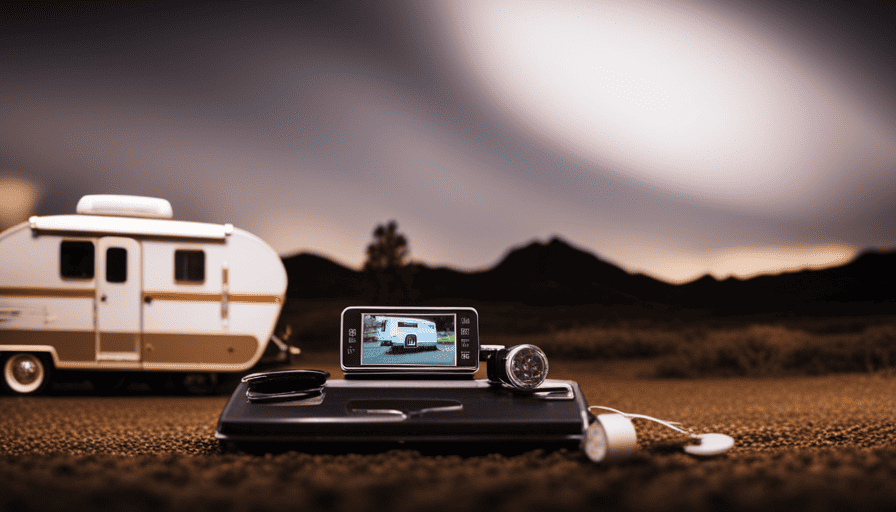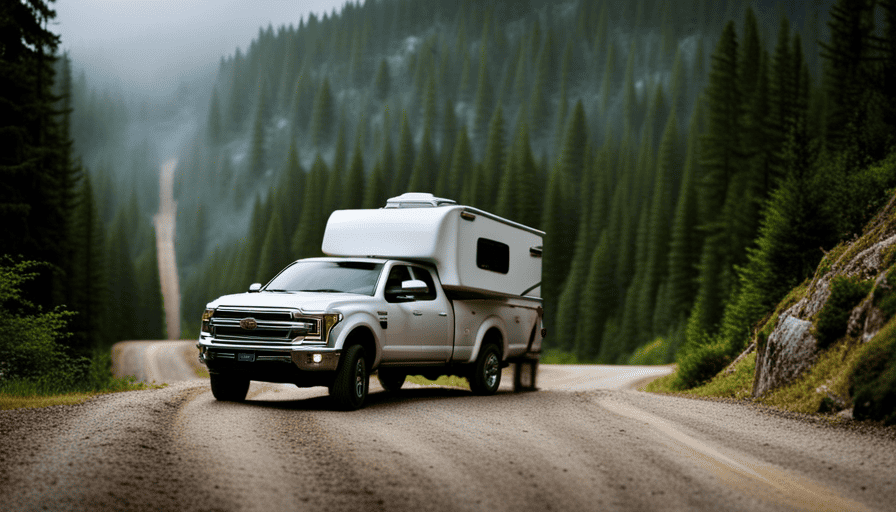Ever curious about the weight of a compact camper?
Well, let me tell you, the answer may surprise you. As a seasoned camping enthusiast myself, I have come across all types of small campers, from teardrop trailers to pop-up campers. And let me tell you, their weight can vary greatly depending on several factors.
In this article, we will dive deep into the world of small campers and explore the different weight classifications, the factors that affect their weight, and even provide you with some average weight ranges. But that’s not all!
We will also discuss considerations for towing capacity, storage and parking options, safety tips for towing, and the maintenance and upkeep of these beloved campers.
So, if you’re ready to uncover the mysteries of small camper weight, then let’s get started!
Key Takeaways
- Small campers come in various styles and weight capacities, with teardrop campers weighing around 1,000 to 1,500 pounds and pop-up campers ranging from 1,500 to 3,000 pounds.
- The weight of small campers is categorized into lightweight, mid-weight, and heavy-duty, with lightweight campers weighing between 1,500 to 3,000 pounds, mid-weight campers ranging from 3,000 to 5,500 pounds, and heavy-duty campers weighing over 5,500 pounds.
- Additional features like air conditioning, awning, propane tanks, and solar panels can add to the weight of a small camper.
- Proper weight distribution, understanding towing capacity, and choosing the right hitch type are crucial for stability and control while towing a small camper.
Types of Small Campers
If you’re curious about the different types of small campers and how heavy they are, you’re in for a treat!
Small campers come in various styles, each with its own unique features and weight capacity.
One popular type is the teardrop camper, known for its compact size and lightweight design. These campers typically have a weight capacity of around 1,000 to 1,500 pounds, making them perfect for towing with smaller vehicles.
If you’re looking for something slightly larger, you might consider a pop-up camper. These campers offer more living space and amenities, but they also tend to be heavier, with weight capacities ranging from 1,500 to 3,000 pounds.
Of course, when considering small campers, cost is also an important factor. Teardrop campers are generally more affordable, with prices starting around $5,000, while pop-up campers can range from $8,000 to $20,000 or more, depending on the features and brand.
Understanding weight classifications is crucial when choosing a small camper that meets your needs and vehicle’s towing capacity.
Now let’s delve into the next section and explore weight classifications further.
Understanding Weight Classifications
Categorizing campers by weight is like unraveling a web of options, each one promising a unique and exhilarating adventure. Understanding weight classifications is crucial when it comes to choosing a small camper that suits your needs. The weight of a small camper is determined by its weight distribution, which affects its stability and towing capacity.
Generally, small campers fall into three weight classifications: lightweight, mid-weight, and heavy-duty. Lightweight campers typically weigh between 1,500 to 3,000 pounds and are designed for smaller vehicles. They are easy to tow and maneuver, making them ideal for solo or couple camping trips.
Mid-weight campers range from 3,000 to 5,500 pounds and offer more amenities and space. They require a larger towing vehicle but still provide a comfortable camping experience.
Heavy-duty campers, weighing over 5,500 pounds, are built for larger trucks and SUVs. These campers offer luxurious amenities and ample living space, perfect for extended trips with family or friends.
When considering camper weight, tire maintenance is essential. Properly inflated tires help distribute the weight evenly, ensuring a smooth and safe ride. Regularly checking tire pressure and tread wear is crucial to prevent blowouts or uneven tire wear.
Understanding weight classifications and tire maintenance are just the beginning. Factors that affect camper weight go beyond just the weight of the camper itself. [Transition into the next section about factors that affect camper weight]
Factors that Affect Camper Weight
To fully understand the complexity of camper weight, you must also consider factors such as the inclusion of additional amenities and features that can significantly impact the overall weight distribution. Understanding camper construction is crucial in determining its weight. Campers are typically made of materials like aluminum, fiberglass, or wood, each with varying weights. The type and thickness of insulation and the construction of the walls and roof also contribute to the overall weight. Additionally, the type of flooring, furniture, and appliances inside the camper can affect its weight. For example, a camper with a full kitchen, bathroom, and multiple sleeping areas will naturally be heavier than one with basic amenities.
To give you a better idea of how these factors can impact camper weight, here is a table showcasing some common additional features and their estimated weight contribution:
| Additional Features | Estimated Weight Contribution |
|---|---|
| Air conditioning | 100-150 pounds |
| Awning | 50-100 pounds |
| Propane tanks | 20-40 pounds |
| Solar panels | 10-30 pounds |
As you can see, even seemingly small amenities can add up and significantly impact the overall weight of a camper.
Understanding these factors is essential when considering the average weight ranges of small campers. [Transition to the subsequent section about ‘average weight ranges of small campers’.]
Average Weight Ranges of Small Campers
Small campers come in a range of weights, from feather-light to as heavy as a small car. The weight distribution of a camper is an important factor to consider when choosing the right one for your needs.
A well-balanced camper will not only provide stability on the road but also improve fuel efficiency. The average weight range of small campers is typically between 1,500 to 4,000 pounds. However, some ultra-lightweight models can weigh as little as 500 pounds, making them easy to tow with smaller vehicles.
When it comes to weight distribution, it’s essential to ensure that the camper’s weight is evenly distributed over the axles. This will help maintain the stability and control of the towing vehicle. Additionally, proper weight distribution can have a significant impact on fuel efficiency.
A well-balanced camper will reduce wind resistance and improve the overall gas mileage. Considering the weight of a small camper is crucial when determining the towing capacity of your vehicle. It’s essential to know the maximum weight your vehicle can safely tow before making a purchase.
By understanding the weight ranges of small campers and considering factors like weight distribution and fuel efficiency, you can make an informed decision about the right camper for your needs.
Considerations for Towing Capacity
When it comes to towing a camper, there are several important considerations to keep in mind.
Understanding your vehicle’s towing capacity is crucial in order to ensure that you’re not exceeding its limits and putting yourself and others at risk.
Additionally, knowing the different types of hitches and how they affect weight distribution is key to maintaining stability and control while on the road.
Understanding Your Vehicle’s Towing Capacity
Imagine the thrill of towing a small camper, knowing that you’ve got a deep understanding of your vehicle’s towing capacity. Understanding your vehicle’s towing capacity is crucial when it comes to weight limitations and choosing the right vehicle for your camper.
By knowing your vehicle’s towing capacity, you can ensure that you stay within the safe weight range and avoid any potential problems on the road. It’s important to consider not only the weight of the camper itself but also any additional gear or equipment that you may be carrying.
By taking all of these factors into account, you can make an informed decision and select a vehicle that’s capable of safely towing your small camper. With this knowledge, you can confidently move on to the next section, where we’ll discuss hitch types and weight distribution.
Hitch Types and Weight Distribution
Now that you have a solid grasp of your vehicle’s towing capacity, let’s delve into the fascinating world of hitch types and weight distribution.
When it comes to towing a small camper, understanding weight distribution is crucial for a safe and stable journey. Weight distribution refers to the way the weight of the camper is distributed across the axles of both the trailer and the towing vehicle. This is important because an improper weight distribution can lead to swaying or instability while on the road.
To ensure proper weight distribution, you’ll need to choose the right type of hitch for your camper. There are different types of hitches available, such as weight distributing hitches and sway control hitches, each designed to address specific towing needs. These hitches help distribute the weight of the camper evenly and improve overall stability.
With the right hitch and proper weight distribution, you can enjoy a smooth and safe towing experience.
Now, let’s explore the impact of weight on fuel efficiency.
Impact of Weight on Fuel Efficiency
To maximize your fuel efficiency, you’ll need to consider the weight of your small camper, as it can be as light as a feather or as heavy as a boulder, impacting your travel expenses. The weight of a small camper plays a crucial role in determining how much fuel it will consume during your journeys. The heavier the camper, the more fuel it will require to move, resulting in higher travel expenses. On the other hand, a lighter camper will be more fuel-efficient, allowing you to save money on fuel costs. To give you a better understanding of the impact of weight on fuel efficiency, let’s take a look at the following table:
| Weight Classification | Fuel Efficiency |
|---|---|
| Lightweight | Excellent |
| Medium-weight | Good |
| Heavyweight | Poor |
| Super Heavyweight | Very poor |
| Ultra Heavyweight | Extremely poor |
As you can see, the weight classifications directly correlate with fuel efficiency. Therefore, it is essential to choose a small camper that falls within the lightweight or medium-weight category to maximize your fuel efficiency and minimize your travel expenses. Considering the impact of weight on fuel efficiency, let’s now delve into the next section about storage and parking considerations.
Storage and Parking Considerations
When considering storage options for a small camper, it’s important to keep in mind the size and weight of the unit. Garage storage can be a convenient option, but it’s crucial to ensure that the camper fits within the dimensions and weight restrictions of the space.
Additionally, when planning trips to campgrounds and RV parks, it’s essential to be aware of any restrictions or limitations they may have regarding camper size, length, and amenities.
Garage Storage Options
Imagine a cozy garage filled with various storage options for your small camper. When it comes to garage organization and space-saving solutions, there are several options to consider.
Here are four ideas to maximize your storage space:
-
Overhead Racks: Install sturdy overhead racks to store bulky items such as kayaks or bikes, freeing up valuable floor space.
-
Wall-mounted Shelving: Utilize wall-mounted shelving units to keep camping gear and essentials neatly organized and easily accessible.
-
Foldable Workbench: Opt for a foldable workbench that can be easily tucked away when not in use, providing a versatile space for repairs and maintenance.
-
Hanging Hooks: Hang hooks on the walls to hang camping chairs, fishing rods, or other equipment, keeping them off the floor and within reach.
With these garage storage options in place, you can efficiently store your small camper and be ready for your next adventure.
As we move on to discuss campground and RV park restrictions, it’s important to be aware of any limitations that may impact your travel plans.
Campground and RV Park Restrictions
When considering garage storage options for a small camper, it’s important to also take into account the campground and RV park restrictions that may come into play.
Different campgrounds have varying regulations and limitations on the size of campers they allow, as well as rules regarding the use of certain amenities or facilities. Some campgrounds may have length restrictions or require specific hookups for water and electricity.
RV parks may have limitations on the number of nights you can stay or may require reservations in advance. It’s crucial to research and familiarize yourself with the specific regulations of each campground or RV park you plan to visit to ensure a smooth and enjoyable experience.
Understanding these regulations will help you plan your trips accordingly and avoid any potential issues.
Now, let’s move on to the next section about safety tips for towing a small camper.
Safety Tips for Towing a Small Camper
To ensure a safe towing experience with a small camper, you’ll want to know that the weight of your camper is crucial, just like how the balance of a tightrope walker’s pole is essential for stability.
Safety precautions and proper towing techniques are vital when it comes to towing a small camper. Knowing the weight of your camper is the first step in ensuring you have the right vehicle and equipment for towing. Exceeding the weight limit can lead to loss of control and increased stopping distances, putting yourself and others at risk.
When it comes to towing a small camper, it’s important to distribute the weight evenly and secure everything properly. Make sure to check the weight distribution and tongue weight to prevent swaying or fishtailing. Additionally, always double-check that the hitch and safety chains are securely attached. It’s also crucial to adjust your driving habits when towing a camper. Allow for extra braking distance, take turns wider, and maintain a slower speed to ensure stability.
Transitioning to the next section on maintenance and upkeep of small campers, regular maintenance is key to keeping your camper in top shape. By following proper maintenance procedures and addressing any issues promptly, you can prevent breakdowns and keep your camper safe and reliable on the road.
Maintenance and Upkeep of Small Campers
When it comes to maintaining and keeping up with my small camper, there are a few key areas that require regular attention. First and foremost, tire maintenance is crucial to ensure safe and smooth travels. Regular inspections of the tires, including checking the pressure and tread depth, are essential.
Additionally, conducting regular inspections of the camper itself is important to catch any potential issues early on and address them promptly.
Finally, staying on top of any necessary repairs is vital to keep the camper in optimal condition for future adventures. By staying proactive and attentive to these areas, I can ensure that my small camper remains in top shape for all my camping trips.
Tire Maintenance
Tire maintenance is crucial to ensure the smooth and safe journey of your small camper. Keeping the right tire pressure is essential for optimal performance. Underinflated tires can lead to poor fuel efficiency and increased wear, while overinflated tires can cause a harsh ride and reduce traction. Regularly checking and maintaining the correct tire pressure is vital.
Additionally, tire rotation is necessary to promote even wear and extend the lifespan of your tires. This involves periodically moving the tires from one position to another, as recommended by the manufacturer. By doing so, you can prevent uneven tread wear and ensure that all tires wear out at a similar rate.
Proper tire maintenance, including tire pressure checks and tire rotation, will contribute to a safer and more enjoyable camping experience. It’s important to remember that regular inspections and repairs are also necessary to maintain the overall condition of your camper.
Regular Inspections and Repairs
Regular inspections and repairs are essential for ensuring the overall condition of your camper remains in top shape. Regular maintenance is crucial to catch any potential issues before they become major problems.
It is important to inspect the tires regularly for signs of wear and tear, such as uneven tread wear or cracks in the sidewall. Additionally, checking the tire pressure regularly is essential to maintain optimal performance and safety.
Common repairs that may be needed include fixing leaks in the roof, repairing plumbing or electrical issues, and addressing any damage to the exterior or interior.
By staying on top of these regular inspections and repairs, you can ensure that your camper is always ready for your next adventure.
Moving on to the conclusion and final thoughts, it is important to remember the importance of tire maintenance and regular inspections for the overall well-being of your camper.
Conclusion and Final Thoughts
Overall, it’s safe to say that a small camper is surprisingly lightweight. When it comes to garage storage options, you’ll be pleased to discover that most small campers can easily fit into a standard-sized garage. This is great news for those who want to keep their camper protected and out of the elements when not in use. Additionally, towing a small camper is generally safe as long as you follow a few key safety tips. First and foremost, make sure your tow vehicle is capable of handling the weight of the camper. Consult your vehicle’s owner’s manual or a professional if you’re unsure. Secondly, properly distribute the weight in the camper and ensure that it is securely attached to the tow vehicle. This will help prevent any swaying or instability while on the road. Lastly, always double-check that your trailer lights are working properly to ensure visibility and safety.
To give you a better idea of the weight of a small camper, here is a table comparing the weights of different popular models:
| Model | Weight (lbs) | Length (ft) |
|---|---|---|
| Airstream | 3,500 | 16 |
| Casita | 2,300 | 13 |
| Scamp | 1,800 | 16 |
As you can see, small campers range in weight from around 1,800 to 3,500 pounds. This makes them easy to tow with a variety of vehicles, including SUVs and some smaller trucks. Just remember to always check the specific weight and towing capacity of your vehicle before hitting the road.
Frequently Asked Questions
Can I tow a small camper with a regular SUV?
Sure, you can tow a small camper with a regular SUV, but there are some pros and cons to consider.
The advantages include the convenience of having your own mobile home and the ability to explore new places. However, there are a few things to keep in mind for safe towing.
Make sure your SUV has the towing capacity and proper equipment. Additionally, practice proper weight distribution and braking techniques to ensure a smooth and secure journey.
How do I determine the weight of my small camper?
To determine the weight of my small camper, I can start by calculating its weight capacity. This involves considering the maximum load the camper can handle. It includes the weight of all the items inside it, as well as any additional weight from water tanks, propane tanks, and other equipment. By subtracting the weight capacity from the total weight of the loaded camper, I can determine its actual weight.
What are the weight limits for different types of small campers?
Weight limits for different types of small campers vary depending on the model and design. It’s important to consider the towing capacity of your vehicle before selecting a camper.
Pop-up campers typically have a weight limit ranging from 1,000 to 3,000 pounds, while travel trailers can range from 2,000 to 8,000 pounds.
It’s crucial to check the manufacturer’s specifications and consult with a professional to ensure your vehicle can safely tow the camper within the weight limits.
Are there any special permits or licenses required to tow a small camper?
To tow a small camper, special permits and licenses may be required depending on your location. It’s important to familiarize yourself with local towing regulations to ensure you’re in compliance. These regulations vary and may include restrictions on weight, length, and even the type of vehicle you can use for towing. Obtaining the necessary permits and licenses will ensure a safe and legal towing experience.
What are the pros and cons of towing a small camper versus driving a larger RV?
When comparing towing a small camper to driving a larger RV, there are several pros and cons to consider.
On the positive side, towing a small camper offers greater maneuverability, easier parking, and better fuel efficiency. However, there are safety concerns to be aware of, such as the potential for swaying and the need for proper weight distribution.
Additionally, towing a small camper may limit living space and storage compared to a larger RV.
Can a Camper King Mattress Fit in a Small Camper?
When deciding whether a camper king mattress can fit in a small camper, it is important to consider the camper king mattress size dimensions. While a small camper may provide limited space, choosing a camper king mattress with dimensions that are compatible can make all the difference. It’s crucial to measure the available space and compare it with the camper king mattress size dimensions before making a purchase.
Conclusion
In conclusion, small campers come in various types and weight classifications, with factors such as materials used, amenities, and equipment affecting their overall weight.
On average, small campers can weigh between 1,500 to 4,000 pounds, depending on their size and features. An interesting statistic to note is that compact teardrop campers can weigh as little as 800 pounds, making them incredibly lightweight and easy to tow.
When considering towing a small camper, it’s important to assess your vehicle’s towing capacity and ensure proper storage and parking. Additionally, following safety guidelines and maintaining regular upkeep will ensure a smooth and enjoyable camping experience.










